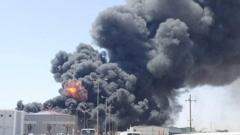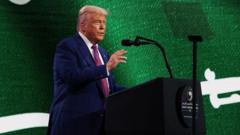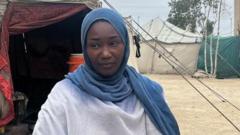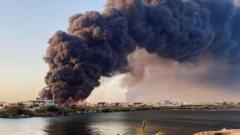As Western nations engage with Syria's new government, the Druse community seeks assurances to safeguard their future.
Druse Leader Advocates for Protections Amidst Syria's Transition

Druse Leader Advocates for Protections Amidst Syria's Transition
Concerns Rise Among Minorities as Syria's Political Landscape Shifts
In a pivotal moment for Syria post-civil war, a Druse leader has taken it upon himself to push for essential protections for his community amidst a rapidly evolving political landscape. Following the ousting of Bashar al-Assad by a coalition of Syrian rebels in December, Sheikh Muwafaq Tarif traveled to Washington to advocate for the 1.2 million Druse people, urging U.S. officials to include protective measures for minorities in any future dealings with the newly formed interim government.
While the rebels who now wield power, principally through the group Hayat Tahrir al-Sham, have denounced their previous ties to more extremist factions like Al-Qaeda and the Islamic State, skepticism remains among religious minorities. Many, including Sheikh Hikmat al-Hajari, the spiritual leader of the Druse, question the commitment to tolerance articulated by the current leadership, expressing concerns over their long-term safety amid the new regime's promises.
Despite a palpable hunger for international assistance in rebuilding the nation, the fears of the Druse and other minority communities underscore the complexities of post-revolution governance. As Western diplomats explore pathways to progress through establishing ties with the rebel leadership, the urgent call for minority rights remains a critical concern in the broader discussion of Syria's future.
The situation in Syria paints a portrait of hope intermingled with trepidation, as various factions within the country navigate the intricate balance of power, identity, and the quest for a peaceful coexistence.
While the rebels who now wield power, principally through the group Hayat Tahrir al-Sham, have denounced their previous ties to more extremist factions like Al-Qaeda and the Islamic State, skepticism remains among religious minorities. Many, including Sheikh Hikmat al-Hajari, the spiritual leader of the Druse, question the commitment to tolerance articulated by the current leadership, expressing concerns over their long-term safety amid the new regime's promises.
Despite a palpable hunger for international assistance in rebuilding the nation, the fears of the Druse and other minority communities underscore the complexities of post-revolution governance. As Western diplomats explore pathways to progress through establishing ties with the rebel leadership, the urgent call for minority rights remains a critical concern in the broader discussion of Syria's future.
The situation in Syria paints a portrait of hope intermingled with trepidation, as various factions within the country navigate the intricate balance of power, identity, and the quest for a peaceful coexistence.





















